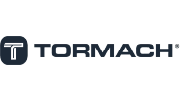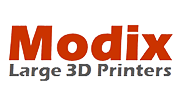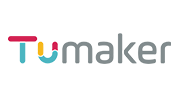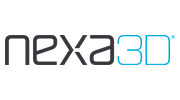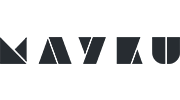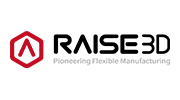How Small Businesses Can Benefit from Fab Labs in the Philippines

Running a small business in the Philippines isn’t easy. From product development to scaling operations, entrepreneurs often face challenges like limited resources, lack of access to advanced tools, and high costs for manufacturing. But here’s the good news: fab labs in the Philippines are opening doors for startups and SMEs to innovate without burning through their budget.
If you’ve ever dreamed of turning your idea into a real product or testing a prototype before mass production, fab labs might just be the game-changer you need.
On This Page
- What Exactly Are Fab Labs?
- Why Small Businesses in the Philippines Should Use Fab Labs
- Key Benefits of Fab Labs for Small Businesses
- Industries Where Small Businesses Can Benefit from Fab Labs in the Philippines
- How to Get Started with Fab Labs in the Philippines
- Frequently Asked Questions About Fab Labs for Small Businesses
- Fab Labs in the Philippines: The Future of Innovation for SMEs
What Exactly Are Fab Labs?
Fab Labs, short for fabrication laboratories, are shared spaces filled with high-tech machines such as 3D printers, CNC machines, laser cutters, and other digital fabrication tools. Think of them as modern makerspaces in the Philippines where entrepreneurs, students, designers, and innovators can bring their ideas to life.
Unlike traditional manufacturing that usually requires a big investment, Fab Labs give small businesses the chance to prototype, test, and refine products at a fraction of the cost.
Related: What is a Fab Lab? A Beginner’s Guide to Digital Fabrication Spaces
Why Small Businesses in the Philippines Should Use Fab Labs
1. Affordable Access to Digital Fabrication Tools
Buying your own fabrication equipment can be a huge expense, especially if you’re a startup working with a tight budget. With a fab lab, you don’t need to shoulder that kind of investment. Instead, you can access world-class tools through affordable membership or usage fees—allowing you to experiment, prototype, and innovate without draining your resources. This cost-effectiveness is one of the biggest benefits of fab labs, making them an ideal solution for small businesses that need to maximize every peso.
2. Rapid Prototyping for Startups and SMEs
One of the most valuable offerings is rapid prototyping for startups. Imagine having an idea today and being able to create a working model tomorrow. With tools like 3D printing and laser cutting, you can build prototypes fast, test them, and make improvements without long delays.
This doesn’t just save time—it also reduces risk. Instead of investing in mass production right away, small businesses can validate their ideas first.
3. Collaboration and Networking in Fab Labs
Fab labs aren’t just about machines. They’re also communities of like-minded innovators. When you step into a fab lab, you get the chance to meet other entrepreneurs, engineers, designers, and mentors who can help you refine your product or even partner with you. For many small businesses in the Philippines, this environment sparks fresh ideas and opens up new opportunities.
Key Benefits of Fab Labs for Small Businesses
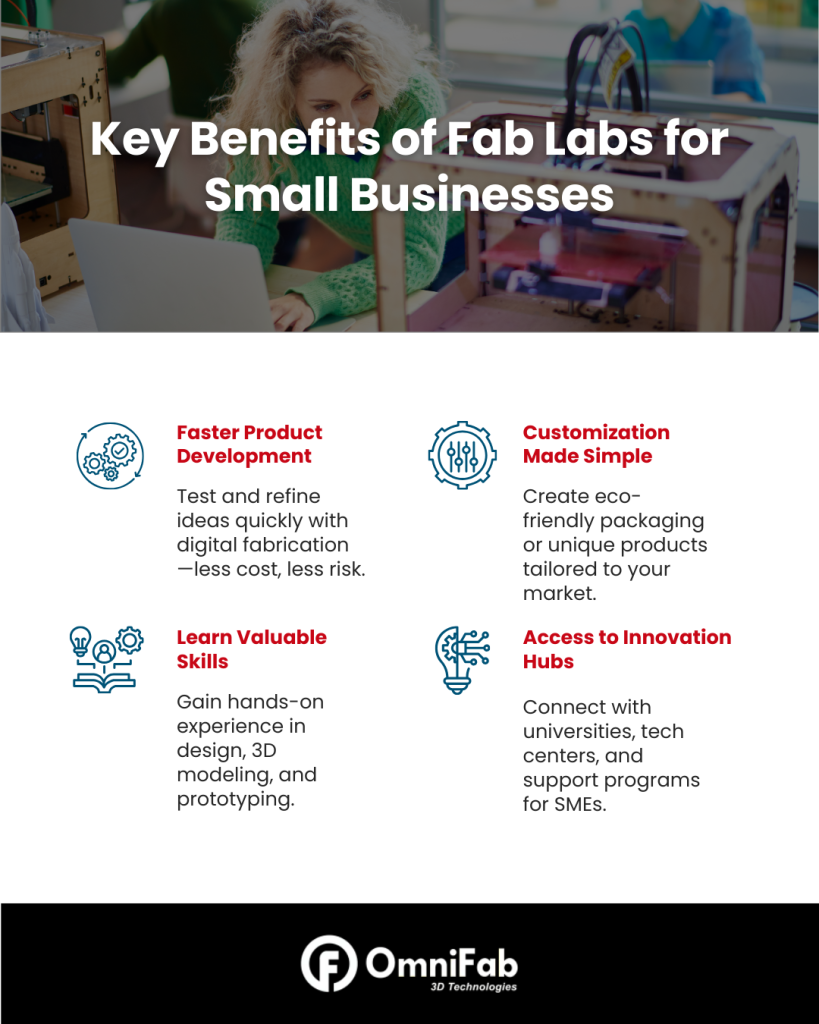
To give you a clearer picture, here’s how Fab Labs can directly support your business growth:
1. Product Development Made Easy
With digital fabrication for small businesses, you can quickly test product designs without the usual expenses tied to manufacturing. This means you can experiment with new ideas faster and with less risk.
2. Customization and Flexibility
Unlike large-scale manufacturing, fab labs allow you to create customized products tailored to specific markets. Whether you’re designing eco-friendly packaging or unique merchandise, customization is easier and cheaper.
3. Skills Development
Another underrated benefit is the chance to learn new skills. Entrepreneurs can pick up design software, 3D modeling, or even basic engineering knowledge. Over time, these skills empower you to make smarter decisions about your products and processes.
4. Bridge to Innovation Hubs
Many fab labs in the Philippines are connected to schools, universities, or tech centers. This connection often leads to collaborations, research opportunities, and even government support programs designed to help SMEs grow.
Related: How Fab Labs in the Philippines Are Transforming Education and Innovation
Industries Where Small Businesses Can Benefit from Fab Labs in the Philippines
Fab labs are not just for large corporations—they’re actually designed to help startups and SMEs bring their ideas to life. With access to digital fabrication tools, small businesses across different industries can test, prototype, and improve their products without spending a fortune. Here are some industries where fab labs make a real difference:
1. Fashion and Creative Startups
Small fashion brands, accessory shops, and independent designers can use fab labs to prototype jewelry, bags, or apparel details using 3D printing and laser cutting. This allows them to create unique, market-ready designs without relying on expensive production overseas.
Related: How is 3D Printing Transforming the Jewelry Industry?
2. Furniture Makers and Home Décor Businesses
Independent furniture makers and home décor entrepreneurs can benefit from CNC machining and 3D modeling. They can test new furniture concepts, experiment with modern designs, and even offer custom-made pieces that stand out in a competitive market.
Related: Industries That Use CNC Milling: Applications and Benefits Across Sectors
3. Food and Packaging for Local Brands
From neighborhood cafés to home-based food businesses, packaging plays a big role in branding. Fab labs give small businesses the chance to prototype eco-friendly and eye-catching packaging using rapid prototyping tools before committing to bulk orders.
4. Tech Startups and Electronics Innovators
Small tech-driven businesses, student-led projects, and startup hardware companies can use fab labs to develop enclosures, casings, or device prototypes. This reduces the cost of testing and ensures products are functional and user-friendly before launching.
5. Training Grounds for Student Entrepreneurs
Many fab labs in the Philippines are located in universities, making them accessible to aspiring entrepreneurs. For students starting small businesses, fab labs provide the perfect environment to experiment, learn, and build prototypes without high upfront costs.
How to Get Started with Fab Labs in the Philippines
If you’re ready to explore this option, here’s a quick guide:
Step 1: Find a Fab Lab Near You
There are several fab labs in the country, often located in universities, innovation centers, and community hubs. You can search for one in your city or province and check their membership requirements.
But if you’re thinking bigger, you can also explore how to set up your own fab lab in the Philippines—a move that not only gives your business direct access to advanced tools but also positions you as a hub for innovation in your community.
Step 2: Define Your Project
Before diving in, be clear about what you want to create. Are you making a prototype, testing materials, or designing packaging? Having a goal helps you maximize your time in the lab.
Step 3: Learn the Basics
Most Fab Labs offer short workshops on how to use the equipment. Take advantage of these sessions so you can confidently operate machines like 3D printers or laser cutters.
Step 4: Start Small
Don’t feel pressured to launch a big project right away. Start with a small prototype, test it, refine it, and grow from there.
Frequently Asked Questions About Fab Labs for Small Businesses
1. What are fab labs in the Philippines?
Fab Labs, short for fabrication laboratories, are innovation spaces equipped with digital fabrication tools like 3D printers, CNC machines, and laser cutters. They allow entrepreneurs, students, and startups in the Philippines to turn ideas into working prototypes without investing in expensive equipment.
2. How much does it cost to use a fab lab?
The cost depends on the fab lab’s location and membership setup. Many fab labs in the Philippines charge affordable usage or project-based fees, making them accessible even to small businesses and home-based entrepreneurs.
3. What are the benefits of fab labs for small businesses?
The biggest benefits of fab labs include access to advanced tools at low cost, the ability to create prototypes quickly, opportunities to collaborate with other innovators, and the chance to learn new skills in design and production. These advantages help small businesses save money, reduce risks, and innovate faster.
4. Can startups use fab labs for rapid prototyping?
Absolutely. Fab labs are ideal for rapid prototyping for startups. Instead of committing to mass production, businesses can test and refine their product ideas using 3D printing, laser cutting, and CNC machining before scaling up. This speeds up product development and ensures better results.
5. Which industries benefit most from fab labs?
Fab labs are useful across many industries—especially fashion and creative startups, independent furniture makers, local food businesses, tech startups, and student-led enterprises. Their tools give small businesses flexibility to experiment, customize, and innovate affordably.
6. Do you need technical skills to use Fab Labs?
Not necessarily. Most fab labs offer training workshops and mentorship to help beginners learn how to use the machines. Even if you’re not a tech expert, you can still take advantage of fab labs to develop your products and grow your business.
Fab Labs in the Philippines: The Future of Innovation for SMEs
With the rise of digital fabrication for small businesses, entrepreneurs now have affordable ways to design, test, and launch products faster and smarter.
As more makerspaces open across the Philippines, fab labs are emerging as more than just workshops filled with machines. They’ve become true innovation hubs for SMEs—providing cost-effective prototyping, product development, and hands-on learning opportunities. Who knows? The prototype you build today might just be the breakthrough that takes your business to the next level.
Take the next step—book a consultation with a Fab Lab expert in the Philippines and explore how digital fabrication can grow your business.


 3D Printing
3D Printing  CNC Lathe
CNC Lathe  Desktop Filament Making
Desktop Filament Making  3D Scanning
3D Scanning  CNC Milling
CNC Milling  Packaging & Labeling
Packaging & Labeling  Bandsaw Cutting
Bandsaw Cutting  CNC Router
CNC Router  Vacuum Forming
Vacuum Forming  CNC Industrial
CNC Industrial  CNC Surface Grinding
CNC Surface Grinding  Waterjet Cutter
Waterjet Cutter 


